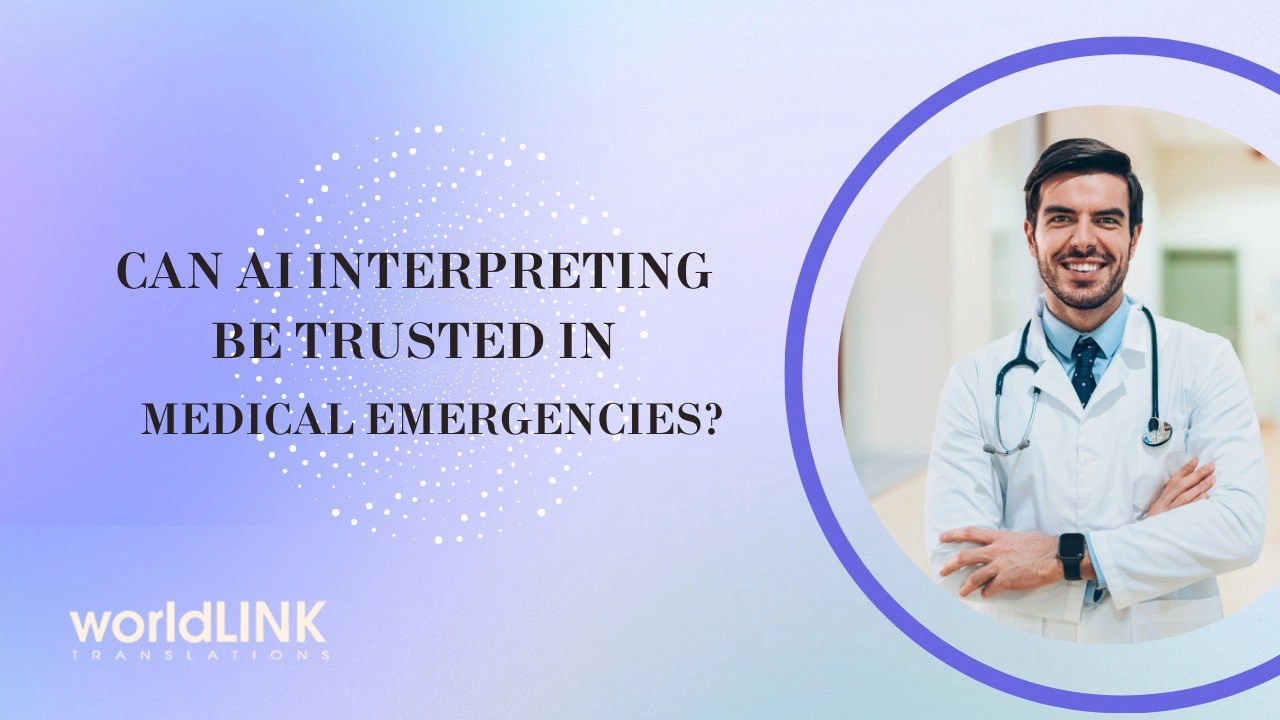In medical emergencies, every second counts. When patients are unable to communicate in the local language, medical interpreting services are often the difference between life and death.
While technology has transformed many aspects of healthcare, the use of AI interpreters in healthcare is still a hotly debated topic. Can AI provide the same level of understanding and accuracy that human interpreters bring, especially in emergency language interpretation situations?
In this blog, we’ll explore the rise of AI interpreting in healthcare, the challenges it faces, and why Massachusetts hospitals and other healthcare providers continue to rely on human medical interpreters.
The Rise of AI Interpreting in Healthcare
AI technology has made significant advancements, offering solutions for everything from language translation to real-time transcription. In the healthcare industry, AI-powered interpreting tools promise faster, more accessible services for patients and providers alike.
- AI tools like AI interpreters are becoming more prevalent in hospital interpretation services in Massachusetts.
- These systems leverage machine learning and natural language processing (NLP) to convert speech from one language to another.
- The appeal of AI lies in its ability to deliver instant, real-time translations for healthcare providers facing language barriers.
However, despite its potential, there are important considerations when AI is used in medical settings, especially during high-stakes emergencies.
Where AI Interpreting Breaks Down
While AI interpreters in healthcare have made strides, they still have significant limitations when it comes to accuracy and nuance, particularly in high-pressure situations such as medical emergencies.
- Lack of Context: AI interpreters can struggle with understanding medical jargon and context, which is critical in medical interpreting services. Misunderstanding a term or instruction could lead to dire consequences.
- Emotional Tone and Sensitivity: AI is unable to interpret the emotional nuances that a human medical interpreter would capture, which could be crucial when delivering bad news or offering comfort to patients in distress.
- Regional and Dialectal Differences: While AI tools may work well in certain languages, they often fail to understand dialects or regional variations, which can be especially problematic in multilingual settings like Massachusetts.
Legal and Ethical Concerns in Massachusetts
The legal and ethical considerations surrounding AI interpreters in healthcare are complex and must be taken into account.
- HIPAA Compliance: The Health Insurance Portability and Accountability Act (HIPAA) mandates that patient data, including spoken conversations, remain private and secure. AI interpreters must be fully HIPAA-compliant to ensure that patient confidentiality is maintained.
- Liability Issues: If AI misinterprets a medical instruction or diagnosis, who is responsible? The healthcare provider, the AI developer, or the interpreter? These questions remain unresolved and add a layer of risk to adopting AI in critical settings.
In Massachusetts, hospitals must ensure that their medical interpretation services are legally sound, leaving many hesitant to fully embrace AI over human interpreting services.
The Role of Certified Medical Interpreters
Certified medical interpreters bring an irreplaceable level of expertise to healthcare settings. These professionals are trained not only in linguistic skills but also in medical terminology, ethical practices, and patient confidentiality.
- Human interpreters can adjust to the urgency and emotional tone of the situation, offering a higher degree of empathy and understanding than AI systems.
- They also play a key role in ensuring accurate communication, reducing the risk of errors in diagnosis and treatment instructions.
For Massachusetts hospitals, human medical interpreters are an essential part of ensuring that patients receive high-quality, culturally competent care.
Real-Life Examples of AI Failing in Healthcare
In real-life scenarios, AI has sometimes faltered, leading to dangerous consequences in healthcare settings. For example:
- A hospital used an AI interpreter during an emergency procedure, only for the machine to misinterpret the patient’s symptoms, delaying treatment.
- AI translators have also been unable to communicate medical nuances, such as the severity of a patient’s pain or their past medical history, leading to inadequate care.
These failures highlight the need for reliable, human medical interpreters who can offer insight and understanding beyond the limits of AI technology.
Why Massachusetts Hospitals Still Rely on Professional Interpreters
Despite the rise of AI in healthcare, Massachusetts hospitals and other medical centers continue to rely on human medical interpreters for several reasons:
- Accuracy: Human interpreters ensure that no critical detail is lost in translation, especially when dealing with complex medical terms and urgent care situations.
- Trust and Comfort: Patients feel more comfortable communicating with a human interpreter, especially in emotional or high-stress moments.
- Legal Protection: Human interpreters are subject to professional standards and are held accountable, ensuring compliance with HIPAA and other healthcare regulations.
For these reasons, while AI interpreters may be useful for routine tasks, professional medical interpreting services are still the preferred option for complex healthcare situations.
Conclusion
The use of AI interpreters in healthcare has the potential to revolutionize communication, but there are significant risks when it comes to medical emergencies.
The nuances of medical terminology, patient emotions, and legal requirements cannot be easily handled by machines. Certified medical interpreters remain indispensable in ensuring accurate, compassionate care for patients, especially in high-stakes environments like emergency rooms.
As AI technology continues to evolve, we must carefully weigh its capabilities against the need for human expertise, especially when it comes to healthcare where lives are on the line.

